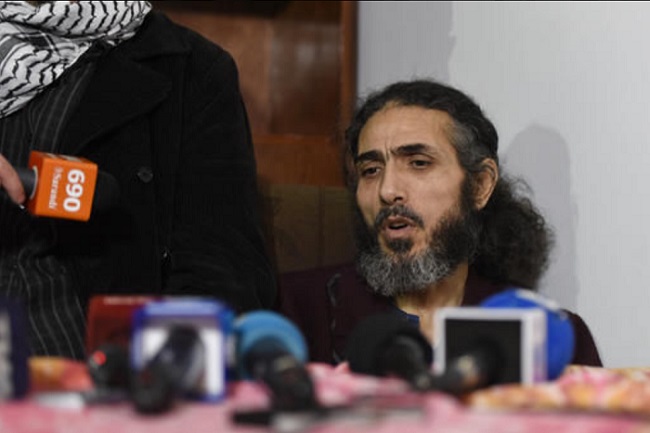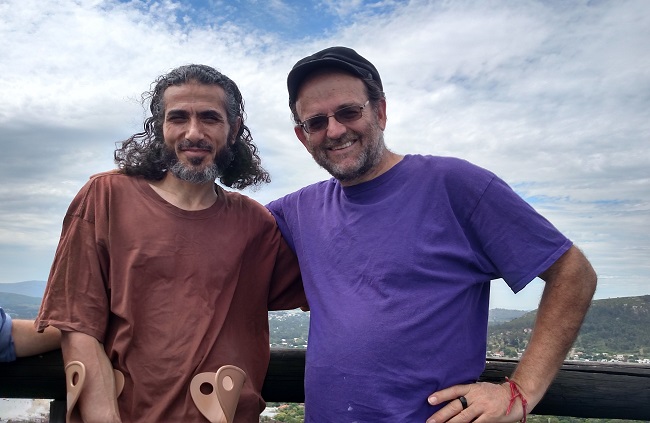
Photo: Abu Wa’el Dhiab at press conference
In 2007, Abu Wa’el Dhiab (aka Jihad Diyab), surrounded by other prisoners on hunger strike in Guantánamo, decided not to join. He had refused to eat at other times (once because guards flushed the Koran down the toilet), but this time, he wasn’t ready. With his fellow prisoners nearby wasting away, he requested to be moved. Permission denied.
When Dhiab joined the strike, prison authorities acquiesced to change his cell. It was too late. He had embarked on a politically motivated fast that lasted, with few exceptions, until leaving Gitmo 7 years later.
While still at the Guantánamo gulag, a Uruguayan official visited Dhiab, age 43, saying his family would be in Montevideo to welcome him to freedom. Upon arriving on December 7, 2014, his family wasn’t there. Month after month he was told to be patient, “no te preocupes,” (don’t worry). The disappointment intensified.
In August 2015 I met Dhiab in Montevideo where my grandparents had taught me to walk. Although born in Wisconsin, my political consciousness emerged from Uruguay. My aunt and uncle, former members of the Tupamaro urban guerrillas, were captured in the 1970s and suffered years under the Uruguayan civic-military dictatorship. In the late 1960s Dan Mitrione, former police chief of Richmond, Indiana (home of my alma mater Earlham College), trained Uruguayan security forces in interrogation techniques. Mitrione “instituted torture as a more routine measure.” His efforts contributed to the country becoming the most tortured per capita in the world.
In 1985 Uruguay transitioned to civilian rule, freeing all political prisoners. That year, our family suffered great loss when my cousin, Marcos Conteris was ambushed by Reagan-sponsored “freedom fighters”. At 24, he worked as a volunteer in Nicaragua and was the only Uruguayan killed during the U.S. contra war.
With my family directly impacted by the Pentagon and its minions, I had no choice but to dedicate my life to promote human rights, most recently supporting Guantánamo prisoners. In 2013, the largest hunger strike to date at the U.S. Naval Base inspired a group of us to fast in solidarity. After 57 days on water-only, I rolled Diane Wilson‘s wheelchair to the White House where she protested Obama’s failure to close Gitmo by scaling the fence.
My protest pointed to the ongoing torture of forcing tubes up the nose of prisoners on hunger strike. The DOD calls this “enteral feeding” in response to “asymmetrical warfare.” I call my protest “active nonviolence” in the face of “state-sponsored serial rape through the nose.”
After a 2-month fast, I was “fed” nasogastrically near the White House on September 6, 2013. This was repeated elsewhere including the DC Federal Court of Appeals on the day it heard arguments about Guantánamo force-feeding; and, fortuitously, the U.S. Embassy in Montevideo, Uruguay.
Having taken on force-feeding solidified my friendship with Dhiab. In January, he asked me to organize a demonstration at the U.S. Embassy in Montevideo on the 14th anniversary of Guantánamo’s opening as a post-9/11 detention and torture center. At that protest, he was administered a nasogastric tube to represent the ongoing heinous practice at Gitmo. In December 2013 the Pentagon imposed a blackout and stopped informing the public about the number of prisoners on strike.
Of the nearly 800 prisoners ever held at Guantánamo, Dhiab is the one who is most identified with protesting against forced-cell-extractions and force-feedings. The lawsuit Dhiab vs. Obama demands that the U.S. government release video recordings of his torture. Federal Judge Judith Kessler originally ordered the force-feeding against Dhiab to stop. Later she ordered the public release of 32 of the videos. The Obama administration is appealing.
I helped Dhiab connect with the lawyer who initially discovered the videos. The Appeals Court hearing on September 8 of this year was argued by lawyers representing 16 well-known media organizations, who also seek to have the videotapes unsealed.

Photo: Abu Wa’el Dhiab and Andrés Thomas Conteris
In June, Dhiab travelled to northern Uruguay for Ramadan. He planned to return home at the end of the holy month. Media accounts about the danger of a “terrorist” on the loose infuriated him and he changed plans. He left Uruguay crossing the porous border in Chuy and headed north by bus through Brazil. When asked for documents, he showed his Uruguayan ID card and the MERCOSUR travel document (passport equivalent) allowing legal entry into Brazil and Venezuela.
On July 7, the U.S. House Foreign Relations Committee referred to Dhiab as a document forger and held a hearing entitled “Demanding Accountability: The Administration’s Reckless Release of Terrorists from Guantanamo.” Much of the hearing was devoted to “Jihad Dhiab, an Al Qaeda-linked terrorist.” Lee Wolosky and Paul Lewis heads of the offices to (ostensibly) close Guantánamo for the State Department and Pentagon testified at the hearing. Both had traveled to Uruguay the previous week when Dhiab went off their radar.
Upon arriving to Venezuela, Dhiab went to the Uruguayan Embassy on July 26 and was later taken into custody by authorities. He was “disappeared” since no one admitted detaining him. I travelled to Caracas and after showing a copy of a mugshot taken when he was arrested, an official at SEBIN (Venezuelan Intelligence) admitted that Dhiab was being held at their headquarters under “humanitarian guardianship.” I was not allowed to visit.
Dhiab well understands that his problems are caused by U.S. policies. He was sold for bounty to the U.S. military by Pakistani police in 2002 and detained initially at the notorious U.S. Bagram Air Force Base in Afghanistan before being transferred to Guantánamo.
He also faults the Uruguayan Government. Aside from the broken promises, the resettlement program administered by the government-assigned NGO Ecumenical Service for Human Dignity (SEDHU) is seriously flawed. Housing and food allowances will end after two years with no renewal planned. Given all this, Dhiab’s wife has refused to move to Uruguay.
His lengthy experience hunger striking in Guantánamo taught Dhiab to use such pressure tactics on behalf of his family. He stopped eating in Venezuela on August 15 when told he would be transferred to Uruguay. Soon after being deported to Montevideo August 30, he stopped drinking and slipped into a coma 12 days later. He had asked not to be hospitalized and was administered an IV. After 9 hours he asked me to remove it to continue with the dry fast. Shortly thereafter, Amy Goodman interviewed him on Democracy Now! where he told the story of encouraging a Guantánamo nurse to disobey force-feeding orders.
Recent Developments
- September 19, Dhiab suspends thirst strike at the request of support group.
- September 29, He holds a press conference where he announces reinitiation of the dry fast on October 3.
- October 3, He stops drinking. If he dies, he holds the U.S. and Uruguayan governments responsible.
- October 7, Uruguayan Foreign Ministry holds press conference to explain their efforts and urges Dhiab to end his two-month hunger strike. I challenged Minister Nin Novoa to take responsibility for Uruguay promising that the family would be waiting in Montevideo upon his release from Guantánamo.
- October 10, he slipped into coma again. Medical personnel administer intravenous glucose and he becomes semi-conscious. Dhiab tentatively agrees to stop the dry fast. The Foreign Minister wrote letters confirming that Uruguay is open to Dhiab moving to Turkey, Qatar, Lebanon or Venezuela. This request formed part of Dhiab’s 9-point petition to the Government’s Commission on Refugees (CORE) and according to the support group, this fulfilled the requirement to suspend the hunger strike.
- October 13, Day 60 of hunger strike. Dhiab is drinking liquids but he is in critical condition and his doctor says that he has a “high risk of sudden death.” Christian Mirza, interlocutor between the Uruguayan Government and Dhiab stated that “Dhiab’s attitudes have not changed” after meeting his condition by delivering copies of four letters to countries where he and his family might resettle. Mirza will continue to work with the 5 other ex Gitmo refugees in Uruguay but resigned from his efforts to help Dhiab.
Although knocking on death’s door, Dhiab has expressed repeatedly that he wants to live, but only with his loved ones in a new country. Worldwide popular support can help reunite his family. Please consider signing this petition and/or contributing to this crowdfunding campaign. Governments have failed Dhiab and his family. It is we the people who can make a difference and bring justice. Please consider contributing even $1.00.
Andrés Thomas Conteris, whose family is from the U.S. and Uruguay, works with Democracy Now! en Español promoting the independent news program to community radio stations in the Spanish-speaking world. He is part of Witness Against Torture, a group seeking to close Guantánamo and has long been involved in movements for justice, especially in Latin America. After befriending Jihad Dhiab a year ago, he has participated in a support group in Uruguay that has helped the former prisoner since he was released from Guantánamo in December 2014. He can be reached at [email protected].
